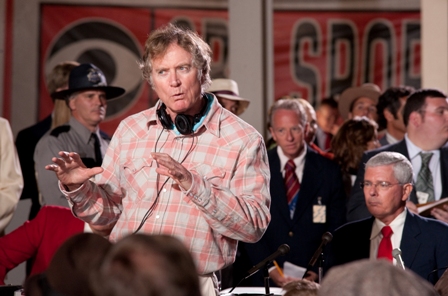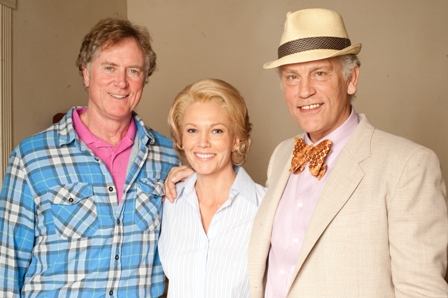CHICAGO – Patrick McDonald of HollywoodChicago.com appears on “The Morning Mess” with Dan Baker on WBGR-FM (Monroe, Wisconsin) on March 21st, 2024, reviewing the new streaming series “Manhunt” – based on the bestseller by James L. Swanson – currently streaming on Apple TV+.
Interview: Director Randall Wallace Returns With ‘Secretariat’
CHICAGO – Randall Wallace began his screenwriting career at the top of the ladder, penning the script for the Best Picture-winning “Braveheart” and earning an Oscar nomination himself. He went on to direct “The Man in the Iron Mask” and “We Were Soldiers,” and returns this week with the inspirational “Secretariat,” the true story of the legendary horse starring Diane Lane and John Malkovich. Wallace recently sat down with us for a very-friendly and informative discussion on where he’s been for the last several years, the films that inspired him, and the difficulties of making a movie about horse racing.
HollywoodChicago.com: What is an interesting question that you’ve been asked by an audience member at a Q&A?
Randall Wallace: I was asked what I learned making the film.
HollywoodChicago.com: Well?
Wallace: All of my movies – “Braveheart,” “We Were Soldiers” – have been about the same things: That hope prevails, courage matters, love works. But they’ve had a level of sadness and loss in them. But this movie celebrates. It propels the audience out with a sense of victory and triumph. And that’s a new thing for me.

Secretariat
Photo credit: Walt Disney Pictures
HollywoodChicago.com: But it also fits with the same themes: That being principled is important. I see that in this movie. And I like the poster too [which was behind me during the interview]. It’s much better than your typical floating head poster.
 Secretariat Photo credit: Walt Disney Pictures |
Wallace: Yeah. Thank you. We fought for that one actually.
HollywoodChicago.com: You had a floating head option?
Wallace: Uh-huh. (Laughs.)
HollywoodChicago.com: If someone just looked up your name on IMDB, the first thing they would probably notice is the large gap between directorial efforts – 2002 to 2010. Why so much time off?
Wallace: It’s a fair question. I don’t like to talk about myself or my personal life much but the fact of the matter is that “We Were Soldiers” was a watershed moment for me. I put my own money into the movie. I went to school to prepare for it. And it was a total experience for me. And just after the movie was over my father died. I had just gone through a divorce about six months before the movie started. And, so when I finished that campaign, it was time for me to really spend every minute I could with my sons – not just because they needed me, but I needed them. I wanted to be at home and really pay attention to my family. And I wanted to focus on the kinds of movies that I wanted to make. My first film was “Braveheart” and that was the standard for me. It’s not like you think that every movie is going to get those accolades. It’s not for the accolades. I look at movies and making them as the story of Samson and his hair: If you don’t have your heart fully committed….it’s like Samson losing his power. I just couldn’t feel that. I wasn’t willing to do a movie that I felt committed to like I did my others until this one came along and I got deeper and deeper into it.
HollywoodChicago.com: But you created those other projects as a writer. How was it different working on something that you didn’t write? How do you find the same level of commitment?
Wallace: The first thing was that it made me a little bit freer about letting the story be alive. I didn’t have this side of myself going “Make sure that they say exactly the word that you wrote.” I have no desire whatsoever to diminish what Mike Rich did but I’m a writer myself and so I had to invent some new scenes and change some dialogue and those things pertained to…Mike’s original laid out the facts of the story but what we didn’t have is what I would consider the soul of the story: The why, the private moments. Those were the things that I added: Penny with her father when her mother dies, Penny alone in the barn, Penny with her father when he dies, Eddie on the race track shouting to Kentucky…
 Secretariat Photo credit: Walt Disney Pictures |
HollywoodChicago.com: I love that moment.
Wallace: Oh, me too. That’s an example: Originally, in the original script, all that happens is that Eddie walks in and sees a bucket that’s empty. And we had this beautiful set designed by Tom Sanders and we were about to tear it down and it was so beautiful and I said “Go get Nelsan [Ellis].” And it was a moment that just unfolded and it’s beautiful.
HollywoodChicago.com: It’s interesting because I was going to go here: That’s not a moment that “actually happened,” per se. So how do you marry the truth of the story you’re telling with dramatic intention as a filmmaker? How important is the balance?
Wallace: Both have to be absolutely true. When you have a moment that’s a synthesis it only works if it is completely consistent with the truth. If it redefines or redirects what we experience as authentic then it won’t work at all. I am not a real artistic guy. I want movies to speak to the kind of kid I used to be who would go to a movie and come out in the heartland and go “My life is going to be different. No one knows that I was here. Nobody cares that I was in this theater. Hollywood’s not polling me. But my life is going to be different after what I just saw.” It happens rarely but when it happens you know it. I didn’t study film in that way. I just went and I knew what hit my heart.
HollywoodChicago.com: There’s a lot of powerful imagery in the film so I think it’s interesting that you say you’re not a visual artist but let’s step back a bit. Naturally, when you say you want to make films that influence people, the follow-up has to be what were those films for you?
Wallace: They are surprisingly eclectic. For the guy that goes out and his first movie’s “Braveheart,” I loved “Mary Poppins.” That movie had a spirit that was brave. My parents’ generation thought nothing of a movie where people broke into song. The movie had a tremendous mood to it. It had a great spirit of fun and it was bold. I loved “Spartacus.” And you can see themes of “Spartacus” in “Braveheart”; there’s no doubt about it. I loved “The Man Who Would Be King.” It wasn’t a big hit but, wow, did that movie have an impact on me.
 Secretariat Photo credit: Walt Disney Pictures |
HollywoodChicago.com: Confident storytelling. As you say, “Bold.”
Wallace: Yes, yes.
HollywoodChicago.com: The horseracing scenes are technically fascinating to me because you can do 30 takes with an actor but you can’t run a horse like that 30 times in a row. How do you make those scenes happen? What’s the most challenging element – that you really only have one or two times to get it right?
Wallace: You don’t have many times to get it right. You’re exactly right. For the safety of the horses and the riders, you can’t run them more than a quarter of a mile at a time. They love to run but, first and last, always for us was that nobody is going to get hurt. I can do take two or cut the scene but I cannot give you back your neck if the horse breaks it. So, let’s all be safe here. It’s way more dangerous than you think. And, of course, the fact of the matter is that the value of a human life is a human life but we couldn’t hurt a horse neither. I had gone to Dean Semler and said I had an idea where the audience would be immersed inside the race – feel like you’re Secretariat or the jockey. We tried different techniques, different cameras. Some of the ways that other horse movies have been shot with lyrical camera movements didn’t work. We had this little camera that worked. On top of the visuals was the sound design. And my composer who composed his score with the editors and sound team. And my editor. All of those threads we orchestrated into this audible experience that ties into the visuals.
HollywoodChicago.com: The casting of Diane Lane is essential to the film’s success. Why her?
Wallace: I don’t want to misconstrue when I say I fought for her. It’s not that the studio didn’t want her, it’s that the studio didn’t think we could have that caliber of actress for the budget that they were willing to give me. We came in and had a meeting and they said, “Here’s the number and not a dollar more.” And the number was less than half of some comparable race horse movies had been shot for. The schedule was less than half of the producer’s previous film – “Miracle” was shot in 90 days and we had 45.
HollywoodChicago.com: Is that a byproduct of the economy changing?
Wallace: Part of it and part of it is what they didn’t think a horse racing movie would travel. So, I’m in there doing two things – saying that the perfect actress for this is Diane Lane and I also wanted John Malkovich and I’m also going to hire Dean Semler, an Academy Award-winning cinematographer. And they were calling and saying things like “What part of not a penny more did you not hear?’ What I said was that the finest people are the way you do the best job. By the way, we finished $1 million under budget and two days ahead of schedule. To shoot this movie in 45 days is quite an achievement. I thought Diane had the perfect combination of charisma without any self-consciousness. Total commitment. And she was utterly directable. She was a collaborator. I saw a movie on an airplane and I don’t want to reveal too much because I don’t want to trash anyone but the lead was a beautiful actress and the whole movie was posing. And Diane decided when she was about 13 years old was that what was inside her was what was interesting. John, every time he steps on the set, delight goes through the crew. I knew on “Man in the Iron Mask,” I would go to John first for his take because all the other actors would watch and go “If I don’t bring my number one game, I’m going to look bad compared to him.”
“Secretariat” opens in theaters nationwide, tomorrow, October 8th, 2010.
 | By BRIAN TALLERICO |


